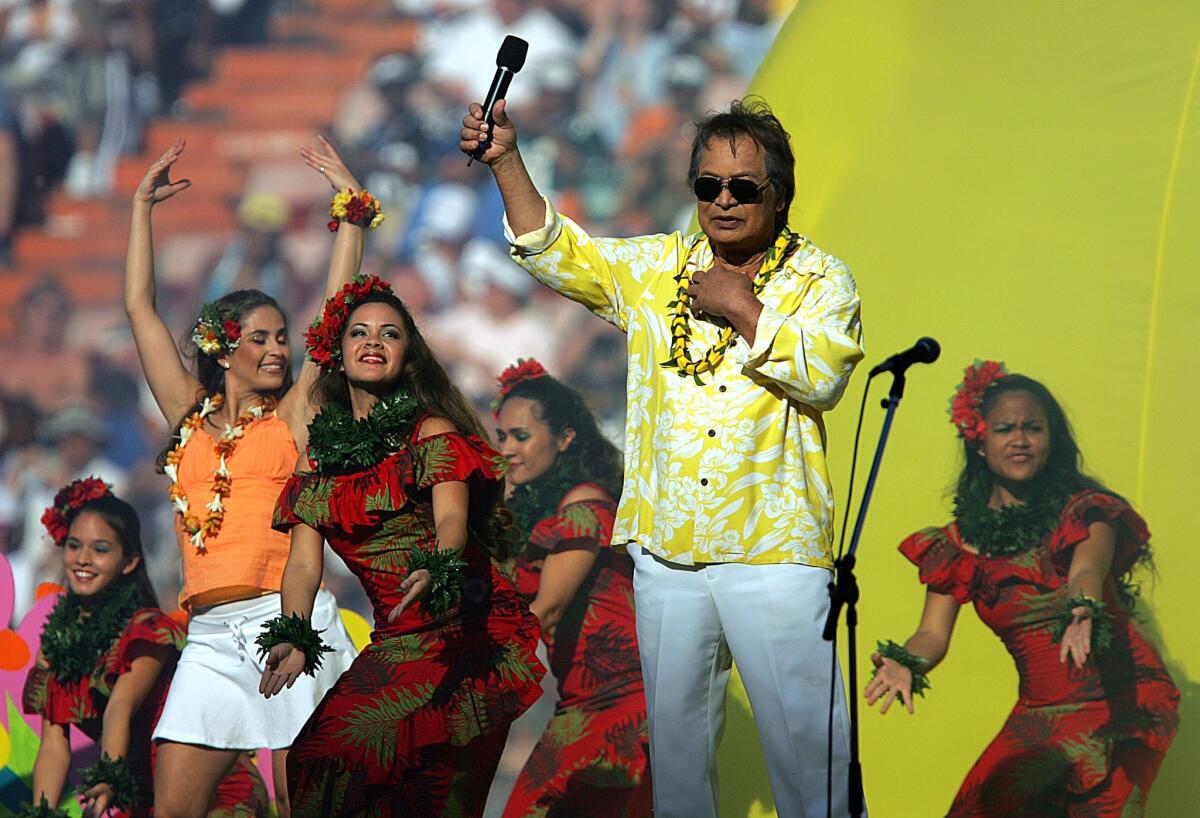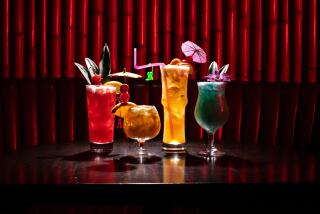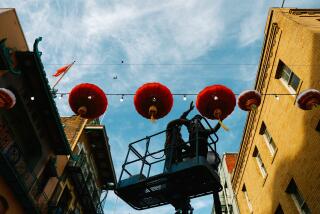From the Archives: Don Ho, 76; singer was best known for ’66 hit ‘Tiny Bubbles’

Don Ho sings at the 2005 Pro Bowl at Aloha Stadium in Honolulu.
- Share via
Don Ho, the iconic Hawaiian entertainer whose signature song, “Tiny Bubbles,” and laid-back, aloha style made him as much an island tourist attraction as Diamond Head and hula dancers for more than four decades, died Saturday. He was 76.
Ho, who had suffered from heart problems for several years and had his pacemaker replaced last fall, died of heart failure, his publicist, Donna Jung, told the Associated Press. He had lived in the Waikiki area of Honolulu.
At the peak of his career in the late 1960s and ‘70s, the casual but charismatic Ho showed up regularly on television talk and variety shows. He also had his own short-lived, ABC daytime daily comedy-variety show from Honolulu in the mid ‘70s and made cameo appearances on “Batman,” “The Brady Bunch” and other TV series.
Originally signed to Reprise Records, Ho scored his biggest recording success in 1966 with “Tiny Bubbles.” His act, which traditionally opened and closed with that song, also included audience favorites such as “Pearly Shells,” “Ain’t No Big Thing,” “I’ll Remember You,” “With All My Love” and “Hawaiian Wedding Song.”
But while his fame burned most brightly for a decade or so, Ho never went away.
The “undisputed king of Waikiki entertainers,” as the Honolulu Advertiser has called him, continued to tour when he wasn’t performing at his longtime home base, the showroom of the Waikiki Beachcomber Hotel.
“Singing is what keeps me young,” Ho, then 70, told The Times in 2001, not long after the trendy magazine Maxim recognized him as one of the “50 Coolest Guys Ever.”
A Hawaiian entertainment fixture since the early 1960s, Ho launched his career singing and playing an electric Hammond chord organ at his parents’ cocktail lounge in Kaneohe, a town on the island of Oahu. But it wasn’t until he was invited to headline at Duke Kahanamoku’s 700-seat Waikiki nightclub in 1962 that Ho began his rise to international fame.
It was at Duke’s that he perfected his laid-back performing style, often entertaining barefoot and bare-chested with a lei around his neck, wearing tight jeans.
Backed by his five-piece combo, the Aliis, Ho would sit at his Hammond organ and sing in a mellow and seductive baritone. His show was lighthearted and fun, periodically punctuated by Ho holding up a glass of Scotch and encouraging the mai-tai-swilling crowd of tourists to “Suck ‘em up!”
The audience was always part of his act. Ho would take requests from honeymooners, joking that they would be given priority because he knew they wanted to leave early and return to their hotel rooms. He’d ask people celebrating birthdays and anniversaries to stand up and be acknowledged. And he’d invite sometimes-reluctant audience members on stage.
With Ho packing them in for three shows a night — no cover and no minimum for the midnight show — Duke’s became the hottest nightspot in Waikiki.
“Don drew all the chicks, and the chicks drew the guys,” entertainment manager and entrepreneur Kimo McVay, who ran Duke’s, once said.
“There’s something magical about the guy; he oozes charisma and he’s very personable, then and now,” McVay told the Honolulu Advertiser in 2000. “He talks to everyone in the room. He has that elusive star power ... and staying power. He casts a spell on you.”
Born in Honolulu on Aug. 13, 1930, Ho was one of nine children with a mixed ethnic heritage that included Hawaiian, Chinese, Portuguese, Dutch and German.
A high school football star (class of 1949), he attended Springfield College in Massachusetts but was homesick for Hawaii and returned home after a year. He earned a bachelor’s degree in sociology from the University of Hawaii in 1954, then joined the Air Force and graduated from flight school as a fighter pilot. A crash landing had an unexpected effect.
“I was a shy kid, quiet, well-behaved,” he once told the Honolulu Star-Bulletin. “The crash made me realize that life was to be enjoyed.”
After leaving the Air Force as a first lieutenant in 1959, Ho returned to Hawaii to run his parents’ cocktail lounge, Honey’s, which was named after his mother. A popular hangout for sailors during World War II, Honey’s had seen better days. To help boost business, Ho later recalled, his father suggested to him, “Son, why don’t you go make music.”
Ho, who had begun playing the Hammond organ for fun while in the Air Force, formed a small band. It did the trick.
“I loved the ipu beat, and you hear it a lot in my music,” he told the Star-Bulletin, referring to a traditional percussion instrument made from a double-headed gourd. “I started to apply it to modern tunes, and guys started coming in with their ukuleles. It got to be a happening. People love live music.”
As word of Ho’s success at Duke’s spread, Reprise Records signed him up and released the live album “The Don Ho Show” in 1965.
In 1966, the same year the live album “Don Ho — Again!” was released, Ho proved he could be as big a draw on the mainland as he was at home.
Opening a two-week engagement at the Cocoanut Grove at the Ambassador Hotel in Los Angeles, he broke attendance records. Appearances in Las Vegas, Lake Tahoe, Chicago and New York followed — as did guest shots on “The Tonight Show” and other programs.
Although Ho always opened and closed his shows by singing “Tiny Bubbles,” his producer, Sonny Burke, and McVay had to pressure him into recording it.
He was tired after playing all night at Duke’s, Ho told the Star-Bulletin, but “Sonny and Kimo leaned on me to record a song they thought was great. I didn’t like it. So, to get away, I sang it once and ran home.”
Ho continued to attract large crowds for his shows at the Beachcomber. A father of 10 children, he sometimes shared the stage with his pop singer daughter, Hoku.
Over the years, Ho was such a big tourist attraction and Hawaiian goodwill ambassador that a Hawaiian business group named him “Salesman of the Century.”
“Don Ho is one of the last of the true classics, the free-and-easy, hanging-out-at-the-bar kind of singers,” Adrian Demain, who plays steel guitar and ukulele with the San Diego band Cheap Leis, told The Times in 2001. “He’s the Hawaiian equivalent to Frank, Sammy and Dean in Vegas.”
Despite enjoying something of a ‘60s-retro renaissance, Ho long ago gave up smoking and drinking -- the contents of the glass on his Hammond organ had been switched from Scotch to pineapple juice or water.
He also made another concession in recent years: No more kissing “grandmas,” dozens of whom would often line up for a kiss.
“I stopped kissing them when one grandma died in my arms, right then and there,” he told the Honolulu Advertiser in 2000. “It was frightening.”
Ho is survived by his wife, Haumea, and numerous family members.
From the Archives: Dean Martin, Screen Star and Singer, Dies at 78
From the Archives: Elizabeth Montgomery Dies of Cancer
From the Archives: Lucille Ball Dies; TV’s Comic Genius Was 77
From the Archives: Elvis Presley Dies at 42; Legend of Rock ‘n’ Roll Era
From the Archives: Wally Cox, 48, ‘Mr. Peepers’ of TV Fame, Found Dead at Home
More to Read
Start your day right
Sign up for Essential California for the L.A. Times biggest news, features and recommendations in your inbox six days a week.
You may occasionally receive promotional content from the Los Angeles Times.






